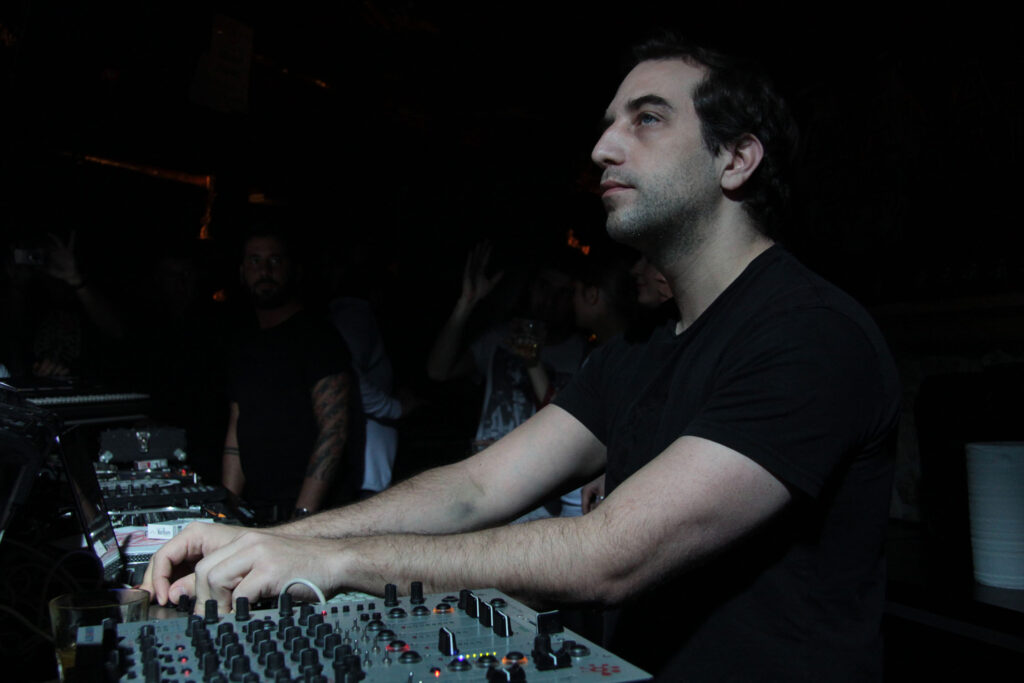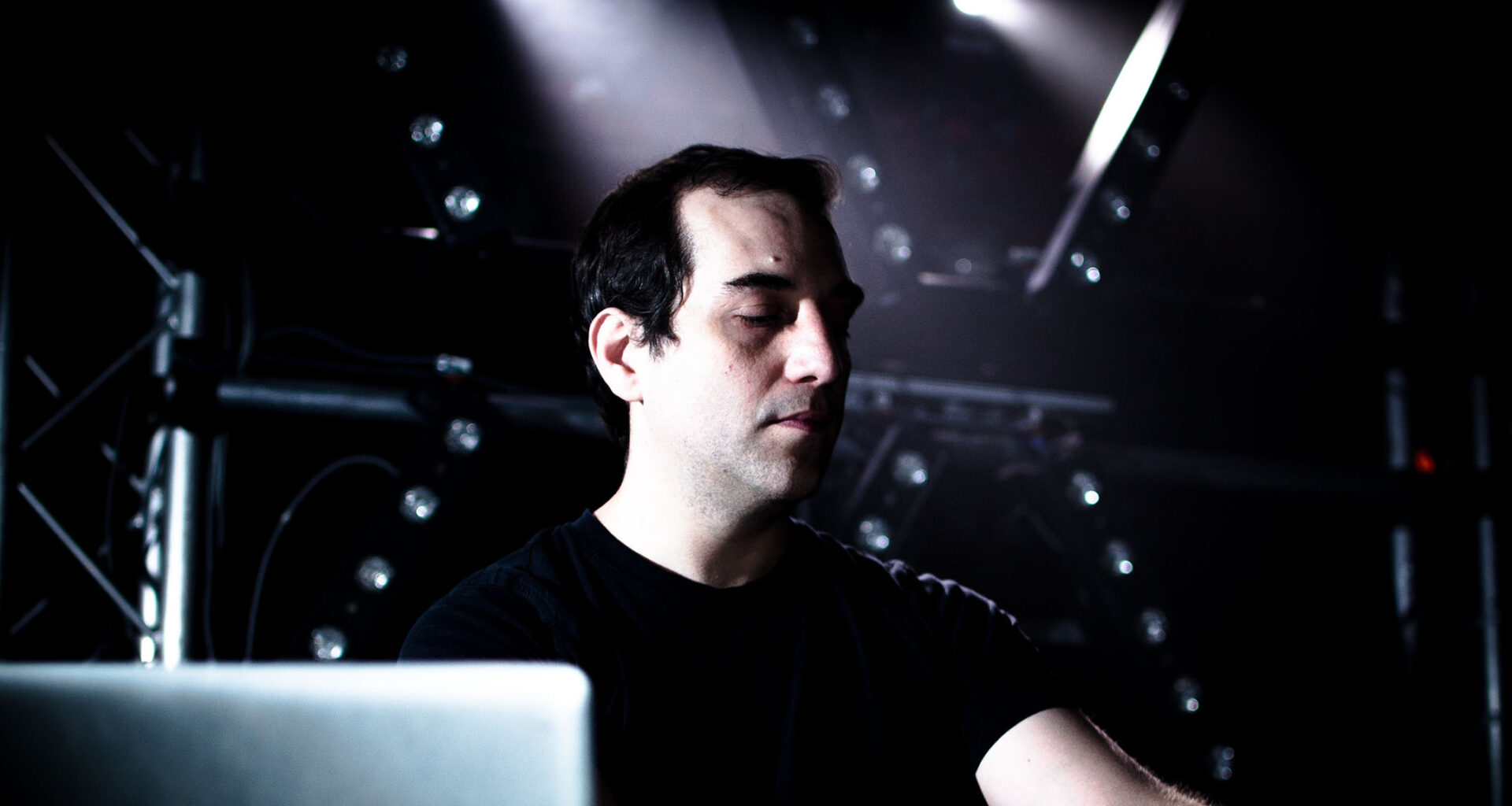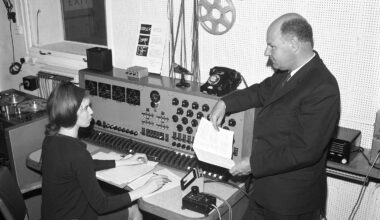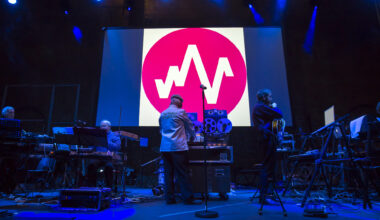He started his career buying vintage synths from Detroit pawn shops and became a key member of Richie Hawtin’s Minus family. But as his latest album proves, Marc Houle is every bit the techno maverick
Is Marc Houle a techno artist?
“I guess I am. Well, sometimes I am. That question comes up a lot actually. I don’t mean people asking me in interviews, I mean it comes up a lot in my head. I’m always wondering what kind of music I make. I’m always wondering where I fit in.”
Let’s park that there for a moment. I’ll come back to it again in a little while. For now, I want to quickly make sure you’re up to speed on the Marc Houle story. Take a deep breath.
Born in 1972 in Windsor, Ontario, Canada’s southernmost city, which sits right across the river from Detroit. Started playing drums at the age of five. Also learnt piano as a child. Bought his first synth, a Roland JX-3P, in 1991. Spent the next few years scouring Detroit pawn shops for analogue gear and making endless electronic tracks in his bedroom. Worked as a graphic designer throughout the 90s. Set up Outputs, one of the earliest web design companies. Ran a gaming night called Atari Adventures at Club 13 in Windsor, where he met Richie Hawtin in 1997. Started DJing at Hawtin’s nights at Club 13, but never mixed records. Never even tried to mix records. Not remotely interested in mixing records. Still making endless electronic tracks in his bedroom, though.
Released his first album on Hawtin’s Minus label in 2004. Set up a Minus offshoot imprint called Items & Things with his old friends Magda and Troy Pierce in 2006. Moved to Berlin in 2008. Released three more albums via Minus before leaving to run Items & Things as a separate label in 2011.
Marc Houle’s new album – his sixth overall, his second on Items & Things – is ‘Cola Party’ and it’s further proof that Houle is treading a radically different path to his techno peers and contemporaries. ‘Cola Party’ is built on strong techno foundations, but ‘Jackn’ Jill’ is a warped house track, ‘Alpha Bit’ sounds like a pitched down new beat tune peppered with heavy showers of fuzz, and ‘Gimme Gimme’ boasts crashing guitars and a bassline reminiscent of Duane Eddy’s ‘Peter Gunn’ riff. The superb ‘I Don’t Want To Know About You’ is minimalism to the max and ‘Raybans In Bahrain’ has the makings of a 22nd century funk classic 100 years ahead of its time.
“It is all over the map,” chuckles Houle. “My first couple of albums were just collections of tracks. They were just dance tracks, party tracks. Later on, I started getting more into themes – ‘Drift’ has this dark, winter storm vibe, for instance – but this time I wanted to go back to making party tracks without any grand concepts or clever directions involved. I didn’t have to push anything or steer anything, so I could focus on having fun.”
Despite this and despite the breadth of ideas on display, ‘Cola Party’ seems to hang together much better than Houle’s previous albums. Maybe that’s down to him taking a more relaxed approach to his music.
Maybe it’s because he’s got more adept at pulling together the disparate elements of his sound. Or maybe it’s simply that he’s developed a clearer understanding of what works and what doesn’t, something that’s undoubtedly been helped by the large number of live shows he plays.
Interestingly, most of Houle’s shows are at clubs not gig venues and it’s not unusual for clubbers to think he’s DJing rather than playing live. But whatever the setting, the opportunity to test tracks on audiences is very important to him.
“When I play out, around half the set is stuff I’m still working on, still deciding what needs doing. I tend to spend the weeks in the studio and the weekends trying tracks out in clubs. When I’m playing I’m always saying to myself, ‘This part is too long’ or ‘This part should be louder’ or ‘OK, there’s a mistake there’. Then I go back to the studio and change things, refine things, fix things. I do that all the time.”
Does a lot of material end up in the bin? You do have a reputation for being one of the most prolific artists around.
“When I first started, I used to make two or three tracks a day, but I’ve slowed down and it’s more like two or three tracks a week now, mainly because I’m just so busy. But when I talk to other musicians, they’re making two or three tracks a month. So, yeah, I am prolific, but it’s not like I’m working hard. I’m just having fun. It’s like playing video games or something. It’s a total pleasure for me.”
Let’s flip back to that opening question. Is Marc Houle a techno artist?
“Ummm… What do they call it when you don’t know who or what you are?”
An identity crisis?
‘That’s it. I mean, it used to be pretty easy, right? It used to be, OK, there’s techno and there’s house, so which one are you? But over the years, everything’s got very blurred. I used to get called a minimal techno artist, but I’m not minimal now. When I hear minimal techno, that’s not me, that’s not what I do. But has what I do changed that much? I don’t think so. I really don’t. I think what’s happened is all the genres and styles have been shifting and swirling together.”
You were in your mid-teens when Juan Atkins and Derrick May and Kevin Saunderson were rolling out all those seminal early Detroit techno tracks. Were you listening to those records at the time?
“For sure,” says Houle. “Actually, before that, my sister brought me back a mixtape from Chicago, with Chicago house tracks like ‘Jack Your Body’ on it, and I was so blown away because those tracks had the sounds I loved, like the Atari Commodore sounds, they had great synthesisers and drum beats, and everything was so simple and repetitive, and I was like, ‘Wow, what is this stuff?’. From there, I discovered the techno parties that were starting up in Detroit, so my friends and I would drive over there every Thursday, Friday, Saturday, Sunday… I spent the next 10 years of my life going to those parties and just dancing all night. At the same time, I was making techno music at home, but I was never part of the Detroit movement, I wasn’t making Detroit techno. I mean, I love it, it’s my favourite kind of music…”
He trails off and sighs.
“Except, well, there are times when I believe I kind of do make Detroit techno. There are elements in there, but mixed in with some Chicago stuff and some new wave stuff and some video games stuff too. I’m somewhere in the middle of all that.”

Would you say you were into sounds more than songs?
“I love melodies. That’s what’s so great about new wave music. You often only have one melody with techno, but with new wave you can go nuts and have 10 layers of synths. But I also love the actual sounds of my synthesisers. I love playing a chord on my Juno 60 and going ‘Waaahh!! Wooohh!!’. Even though I’ve had a Juno 60 for 20 years, I still get excited about the sounds it makes because it’s so good, it’s so beautiful. I don’t buy many new synths, I tend to stick with the ones I’ve already got, they’re like my arsenal, but there’s always some old crazy synth that does something you’ve never heard before. Then when you hear it, you wish you’d had it and used it 10 years ago.”
There are lots of dark and moody synth lines on ‘Cola Party’. There are some very sinister sounding vocals too. They work especially well on ’S-T-E-A-K’ and on the album title track, both of which remind me of how Stephen Mallinder’s voice was heavily treated on the early Cabaret Voltaire records.
“Cabaret Voltaire were too scary for me, but I loved John Foxx and Gary Numan,” says Houle. “John Foxx’s synthesiser lines are incredible. He does moody better than anyone. Better than I ever could. But, yeah, it’s about emotions, right? It’s the emotions in sounds. Sometimes you pick a synth because it sticks out, like a DX7, because you want it to cut through the mix and you want it to throw the melody, and when you do that it changes the way you feel. I love doing that. For me, that’s the fun of playing a synthesiser. It’s about creating moods and creating feelings.
“With the vocals, I like to try different ideas. So with ‘I Don’t Want To Know About You’, that’s my voice without any effects. With ‘S-T-E-A-K’, I changed the shape of my mouth to get that main vocal sound instead of just using effects [pulls his mouth into a large oval shape]. So, yeah, I don’t want to do the same thing all the time. I like to mix it up and play around with my voice. Pitched up, pitched down, changing my mouth shape, making noises, singing harmonies…”
By mainly using vocals as a sound, as a sonic texture, I guess that means you’re not so interested in lyrical narratives?
“I don’t sit around writing poetry and coming up with great lines,” he says. “Sometimes I want to just play another synth, but if a track needs something else, a different element, I’ll put in a vocal and see how it works. A lot of times, it’s just a voice acting as a placeholder, though. Sometimes I’m just singing ‘Blah-blah-blah-blah’, but then I find that ends up being pretty much the song.”
I want to try this one last time. Just for the hell of it. Is Marc Houle a techno artist?
“Maybe there’s some genre out there that I don’t know about and maybe that’s what I am, that’s where I fit. I do sometimes wonder if that’s the case.”
That would actually make a lot of sense. And here’s one of the many things I find intriguing about Houle. He learnt his trade in Detroit, in the crucible of techno, and he was a key member of Richie Hawtin’s Minus family for a good number of years. So in many ways, Houle has the credentials of a techno insider. But it doesn’t take more than half a listen to ‘Cola Party’ to realise that he’s actually very much a techno outsider, a techno maverick. Perhaps it’s all that analogue gear he uses, perhaps it’s his love of Foxx and Numan and the like, but Houle’s sound seems to be rooted more in mechanisation than in technology. You can hear it on several tracks on ‘Cola Party’ and most particularly on ‘Hot Sauce’, where the rattling snares sound like a military band going at it hammer and tongs.
“It’s interesting that you say that,” grins Houle. “Something I’ve often thought about is what it would be like for a big military drum corps to play ‘Spastik’, the Plastikman track [makes lots of drum noises]. That’s one of the things I want to see before I die. That would make me the happiest person in the world. I did tell Richie Hawtin he should do that, but I think it’s probably more of a Marc idea than a Rich idea.”
That’s almost certainly true. When it comes to playful concepts, Houle has form. A few years ago, he released ‘Techno Vocals’, a track that took a humorous swipe at the pitched down vocals popular with some techno artists, including himself sometimes. He’s also not averse to recording with other artists. He’s never worked with a marching band – not yet anyway – but he has collaborated with Veronica Vasicka from Minimal Wave and with French electrohead Miss Kittin. And then there’s La Folie, Houle’s synthpop band with his old friend Joaquim dos Santos.
“La Folie is almost like a surreal joke,” he laughs. “We’ve been recording an album for 13 years now. It’s all ready to go, we mixed it down in an incredible studio and it’s been mastered, but it hasn’t been released. I don’t know what will happen with it. On top of that, we’ve played just one show in 13 years. I’m still writing songs for the project, though. There’s about 120 in the queue for Joaquim to sing on. I love sitting there coming up with keyboard lines for the sort of songs I could never play to the club crowds. You know, 2,000 people who want to dance hard don’t want to hear pop songs or romantic songs. So, yeah, it’s great because it’s another avenue for me to express myself.”
And there are plenty more avenues for Houle to still explore. Have I mentioned his fondness for Black Sabbath yet? Or Prince? Or Kraftwerk? Mind you, Kraftwerk should be a given.
“I grew up loving Kraftwerk,” he says. “But Kraftwerk grew up loving The Beach Boys. Listen to ‘Autobahn’ – ‘Wir fahren fahren fahren auf de autobahn’ – and it’s a Beach Boys song. I mean, yeah, holy crap, but it is. That’s what’s so exciting about music. You keep chasing it, but you can’t really analyse a single moment because all music has been built on layers and layers and layers of stuff that’s come before.
“I’m fascinated by anything and everything to do with music. I watch so many documentaries about it – the origins of music and how it has evolved, classical music, music from the 1920s and the 1930s – and it’s all tied in, everything relates to everything else, and you don’t realise that if you focus on one type of music or one aspect of music. You have to look at the whole picture to fully understand the giant formation of where we are now.”
Which, of course, goes some way to explaining Marc Houle’s musical identity crisis. May it continue for many years to come.
‘Cola Party’ is out on Items & Things
Items & Things
Marc Houle, Magda and Troy Pierce are the joint owners of the Items & Things label. They started I&T in 2006, when they were all signed to Richie Hawtin’s Minus imprint, but released just four or five records in as many years. They trio left Minus to focus on I&T in 2011.
What’s the dynamic like between the three of you?
“We’ve been friends since we all first started making music,” says Marc Houle. “We’re just normal people – we hang out, we make stupid jokes, we have fun. We yell at each other sometimes, but one minute later we’re cracking jokes again. It’s very relaxed. It feels like we’re all going down the same road, but we’re each taking a different vehicle.”
What three words would you use to describe Magda?
“Hmm. That’s tough. I don’t want to say something too good, but I don’t want to be too mean. Special… little… squirrel [laughs]. She’s good at looking for nuts that nobody else has found and putting them together in a neat pile [laughs again].”
And three words to describe Troy?
“Cool… motorcycle… They can be random words, right? Cool motorcycle… tattoo. He’s definitely the cool one, you know. He wears the best clothes.”
You have a plus one on the guest list for a Depeche Mode gig. Would you take Magda or Troy?
“Errrrr… [long pause]. Probably Troy because Magda would be way too busy. Magda is always way too busy. Troy would know all the tracks too.”
What if it was a plus one for a Black Sabbath gig? Magda or…?
“Troy. For sure. We talk about Black Sabbath all the time. We both love Sabbath. I mean, how can you not?”
Who would win an arm wrestling competition between the three of you?
“Troy. This isn’t fair, Troy’s getting all the answers.”
What three words would Magda and Troy use to describe you?
“Retarded… clown… nerd. Yeah, retarded clown nerd, that’s pretty much me. That’s not good, is it? I’d rather be the cool motorcycle tattoo guy, but I’m just not [sighs]. But I’m always happy, I’m always laughing, so that’s OK, right?”






